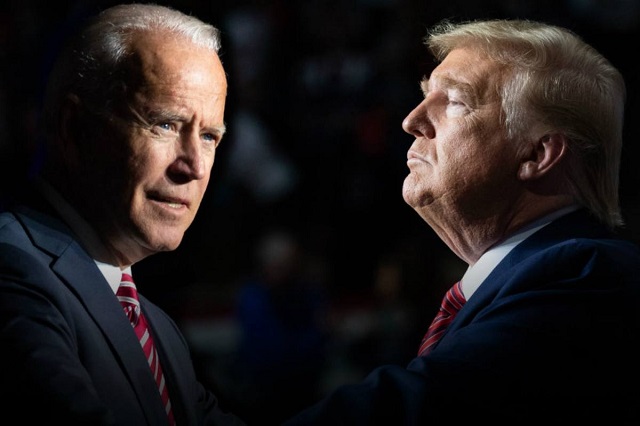
Washington, US | Xinhua | U.S. President Donald Trump and Democratic presidential nominee Joe Biden on Thursday offered strikingly different visions in their final debate before Election Day, one that was more policy-focused and less rancorous than the pair’s first encounter some three weeks ago.
Held at Belmont University in Nashville, Tennessee, the debate came as the presidential race reached the homestretch — 11 days to Election Day when the debate was a wrap. Some 48 million voters have already cast ballots.
Addressing the recent surge in COVID-19 cases in the country, Trump said spikes in Florida, Texas and Arizona are “now gone,” claiming without evidence that current increases in some other places “will soon be gone.”
He bragged about a vaccine that’s “going to be announced within weeks,” only to backtrack by saying it was not a “guarantee” when pressed by moderator Kristen Welker of NBC News.
Biden faulted Trump for failing to inform the public of the lethality of the virus in time, downplaying the severity of the pandemic and refusing to take responsibility for curbing the spread.
On his own strategy, the former vice president said he would encourage mask-wearing, invest in rapid testing and set up a national standard to adjust the pace of reopening based on the trajectory of caseloads.
“We’re about to go into a dark winter and he has no clear plan,” Biden said of Trump, who responded by saying “we’re opening up our country. We’ve learned and studied and understood the disease.”
While Trump claimed “we’re learning to live with” the coronavirus, Biden rebutted that “we’re learning to die with it.” Trump did take the rare step to pledge that he takes “full responsibility” for the impact of the pandemic, after Biden said “anyone who’s responsible for that many deaths should not remain as president of the United States of America.”
Thursday’s face-off should have been the third debate, but Trump declined to participate in the session originally scheduled for Oct. 15 after it was altered to a virtual format due to the president’s COVID-19 diagnosis, resulting in both teams holding their own townhall meetings with voters that day.
To avoid the chaos of mutual interruption that defined the pair’s first encounter on Sept. 29, the Commission on Presidential Debates, the nonpartisan organizing body of the event, changed the rules, that will mute the candidates’ microphones when their opponents are given two minutes to answer the first question of each of the six 15-minute segments, so that the speaking person will not be interrupted.
The clash between the candidates escalated into personal attacks during the second segment in which national security was raised.
Biden said any country seeking to interfere into the U.S. election will “pay a price,” while Trump fired back by accusing his rival of utilizing his vice presidential capacity to gain money from foreign interests for his family.
“I have not taken a penny from any foreign source ever in my life,” Biden said, chiding Trump for “bringing up all this malarkey” to avoid talking about “substantive issues.”
On health care, Trump suggested that Biden would deprive people of their private health insurance and adopt “socialized medicine” instead. Biden responded that he would add a public option to the Obamacare to make it “Bidencare,” adding that the reason he was fighting for the Democratic nomination with 20 candidates was “I support private insurance.”
Trump called himself “the least racist person in this room” when the discussion moved to races in America, condemning the Black Lives Matter protesters for what he said was their referring to the police as “pigs in a blanket,” and zeroing in on Biden’s involvement in crafting a tough crime bill that got passed in the Senate in 1994.
Biden, a U.S. senator then, conceded that the passage of the crime bill — which among other things, encouraged police officers to carry out more drug-related arrests — “was a mistake.” As Biden went on to say he was committed to mending the law so that people won’t be put in jail “for a pure drug offence,” Trump interrupted by saying “Why didn’t he get it done? See, it’s all talk, no action with these politicians.”
Moments before that, the former vice president took the offensive to say that Trump “pours fuel on every single racist fire,” citing Trump’s comments on Mexican immigrants, his decision to ban Muslims from traveling to the United States, as well as his refusal to denounce white supremacy.
After the conclusion of the debate, which also touched upon climate change, foreign policy and economic relief, Biden told reporters before boarding his plane that it should be the viewers’ job to assess how the debate went.
“I felt good about it and I thought the moderator did a great job of making it run smoothly and so it was much, much more rational debate than the first one,” he said.
In a phone call with reporters following the debate, Trump campaign communications director Tim Murtaugh echoed the president’s characterization of Biden as a career politician favoring words over deeds.
“Joe Biden has been a Washington politician for almost 50 years and now he says he’ll get it right. The President nailed it tonight,” said Murtaugh. “Joe Biden is all talk and no action. President Trump won this debate in a blowout.”
******
Xinhua
 The Independent Uganda: You get the Truth we Pay the Price
The Independent Uganda: You get the Truth we Pay the Price





